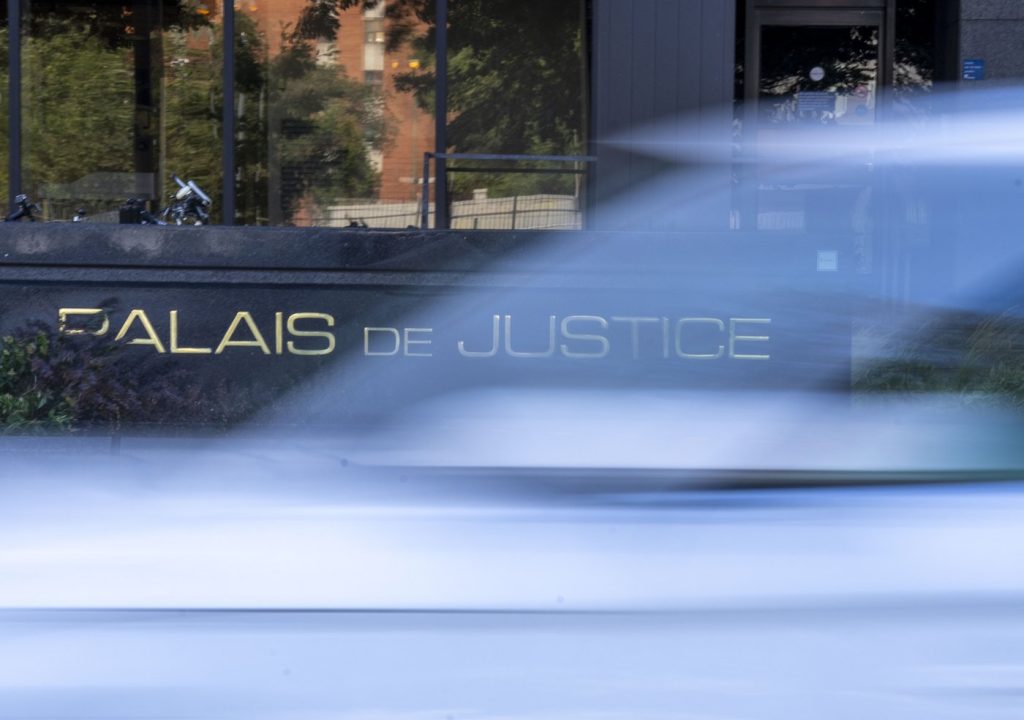McGill dismantling pro-Palestinian encampment on downtown Montreal campus
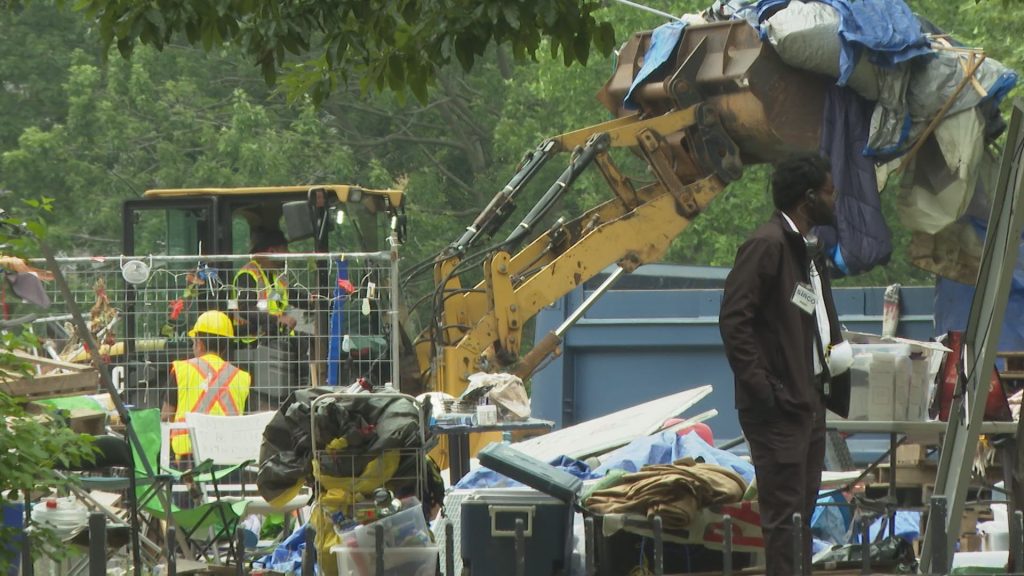
Posted July 10, 2024 7:29 am.
Last Updated July 10, 2024 6:48 pm.
The pro-Palestinian encampment on the lower field of the downtown campus of McGill University is being dismantled by the school – citing health and safety concerns. A notice of eviction was served by the school early Wednesday morning, just before 5 a.m., and about 50 protesters were onsite at the time.
Some participants left the camp and began protesting in nearby streets.
As a result, the campus was closed for the day and the university is asking people to stay away. Classes typically held on campus will move online.
The University said security personnel and Montreal police (SPVM) were on site.
“Earlier today, in close collaboration with the City of Montreal and police, the University began the dismantlement of the encampment on the lower field of McGill’s downtown campus through the engagement of a qualified security firm. The downtown campus is closed today to protect the safety of our community,” said Deep Saini, President and Vice-Chancellor of McGill University in a press release on Wednesday morning.
“McGill will always support the right to free expression and assembly, within the bounds of the laws and policies that keep us all safe. However, recent events go far beyond peaceful protest, and have inhibited the respectful exchange of views and ideas that is so essential to the University’s mission and to our sense of community,” added Saini in the press release.
The encampment was setup on McGill’s lower field at the end of April.
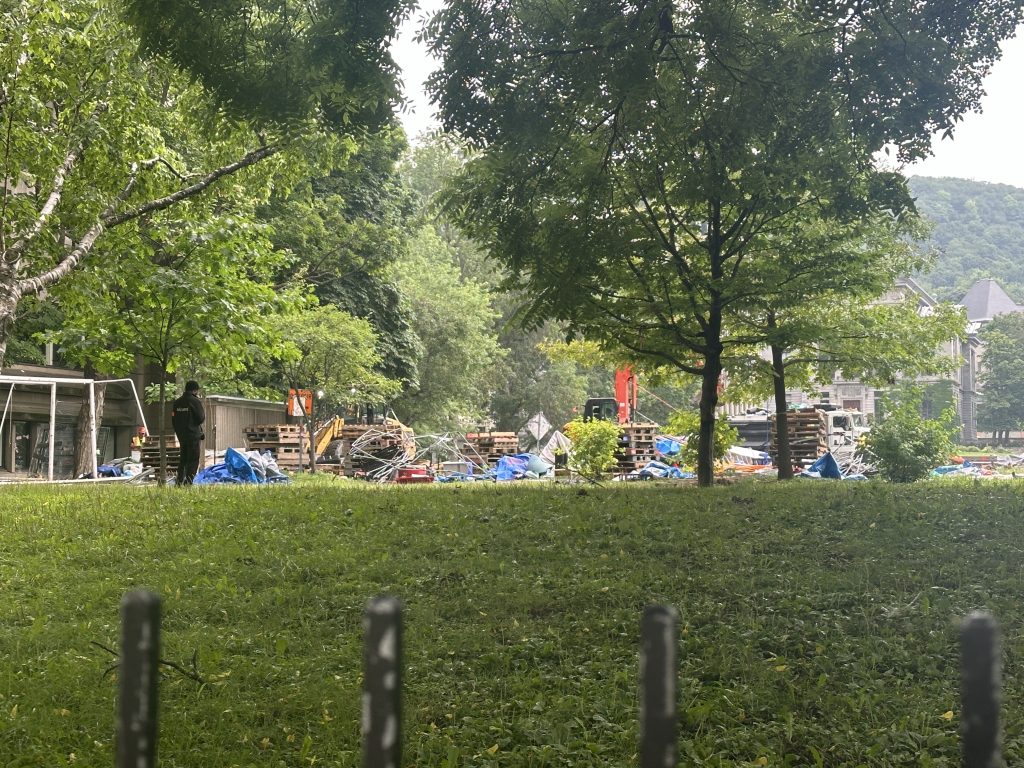
On social networks, the group Solidarity for Palestinian Human Rights, McGill Division, claimed that the camp was “under attack” and said it was in “urgent need” of support to “defend the camp.” “Bring masks, goggles and personal safety gear,” the group wrote.
In an email statement SPHR McGill said: “The protestors were informed that they were ‘breaking and entering’ on their own campus, despite two requests for injunctions against the camp having been denied by the court.”
A masked protester, who did not wish to give his name, told CityNews after he was escorted out of the encampment that, “McGill just needs to know this isn’t the end. Like they can dismantle us, they can tear down our fences but every time they do this, every time they react with violence, every time they try to suppress us, it just lights the fire more. And we’ll be back. They haven’t divested yet and it’s not an if, it’s a when.”
He added that, “I mostly am feeling a lot of anger at the lengths that McGill and the city is willing to go to try and silence and crush a movement that is here fighting against an actual genocide.”
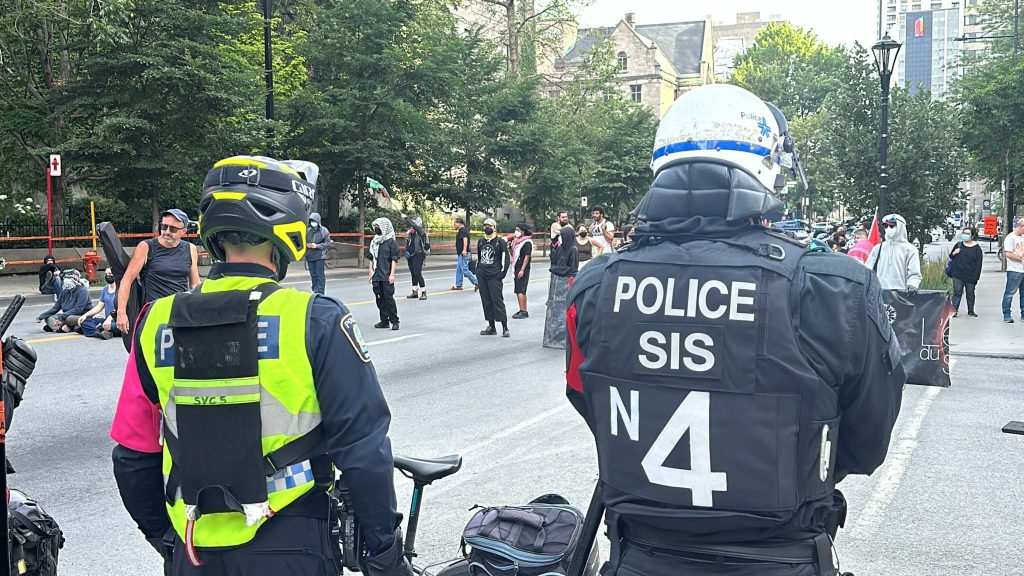
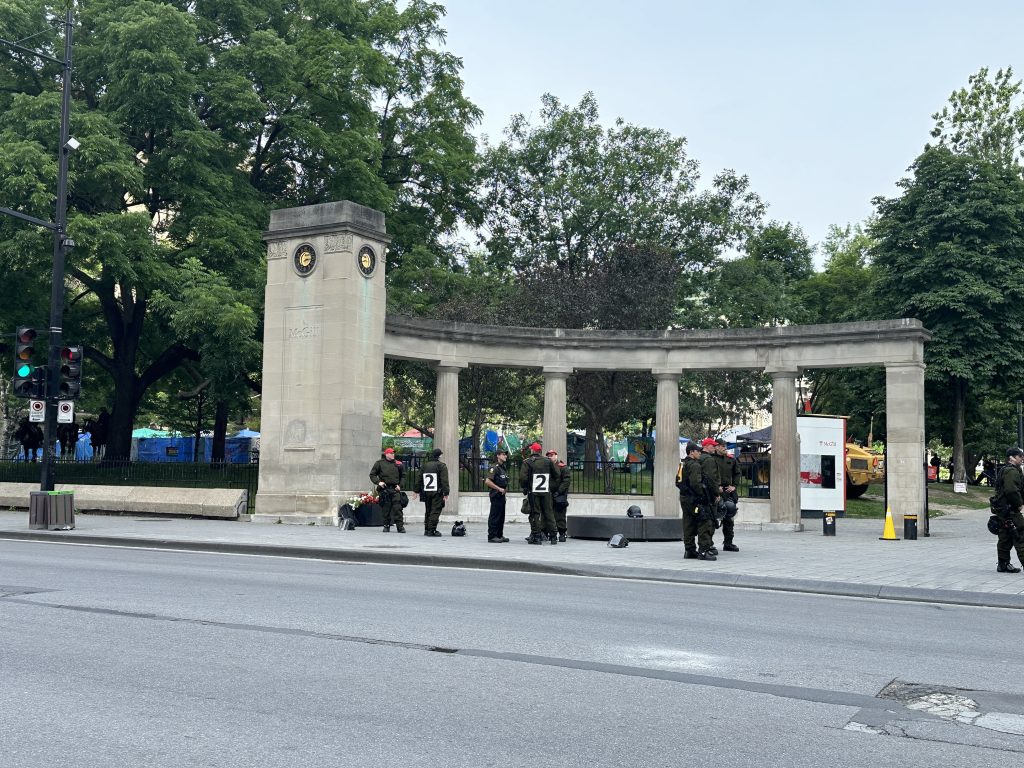
Outside the campus, Zeyad Abisaab, a spokesperson for the encampment, said that, “The student movement is going to remain steadfast, and we will strengthen our resolve. You know, whatever happens today does not affect the student movement not a bit. It just showcases how incompetent McGill, and their private police are.”
In an email release on Wednesday morning, the group Désinvestir pour la Palestine wrote that one participant at the camp said, “This situation is absurd. We were told that we are breaking and entering on our own campus for protesting,” according to another participant in the same email release. “As we continue to witness bodies pull from the rubble [amid the war], I promise that students will not end the fight for divestment at this encampment.”
Montreal police outside the campus for security purposes only
There was a heavy police presence on Wednesday morning outside the campus on Sherbrooke street. SPVM officers on bikes, on foot, and in riot gear as well.
Police say the dismantling operation is being conducted by McGill.
“Police officers are onsite for security purposes just outside the site for security purposes,” said constable Jean-Pierre Brabant from the SPVM just after 6 a.m. Adding that any questions should be directed to the school.
“Everything is going well so far, police are on Sherbrooke and no police intervention has been needed,” Brabant told CityNews at around 7:40 a.m.
Just before 10 a.m., police confirmed that there had been one arrest for assaulting a security guard. The guard was not injured, but the person was taken in by officers and is collaborating. No details on any possible charges yet.
SPVM expects to have an update by end of day on any other arrests.
‘Prioritizing safety’
In their press release, McGill said that “efforts are being undertaken with extreme diligence, while prioritizing the safety and well-being of all.”
McGill also claimed that “people linked to the camp have harassed our community members, engaged in antisemitic intimidation, damaged and destroyed McGill property, forcefully occupied a building, clashed with police, and committed acts of assault. […] The risks emanating from the camp have been escalating, steadily and dangerously.”
In reaction to the announcement of the dismantling, the Advisory Centre for Jewish-Israeli Relations and Federation CJA welcomed the fact that McGill University was taking steps to “prioritize the safety and well-being of its academic community, and to put an end to toxicity […] and the targeting of Jewish students on campus.”
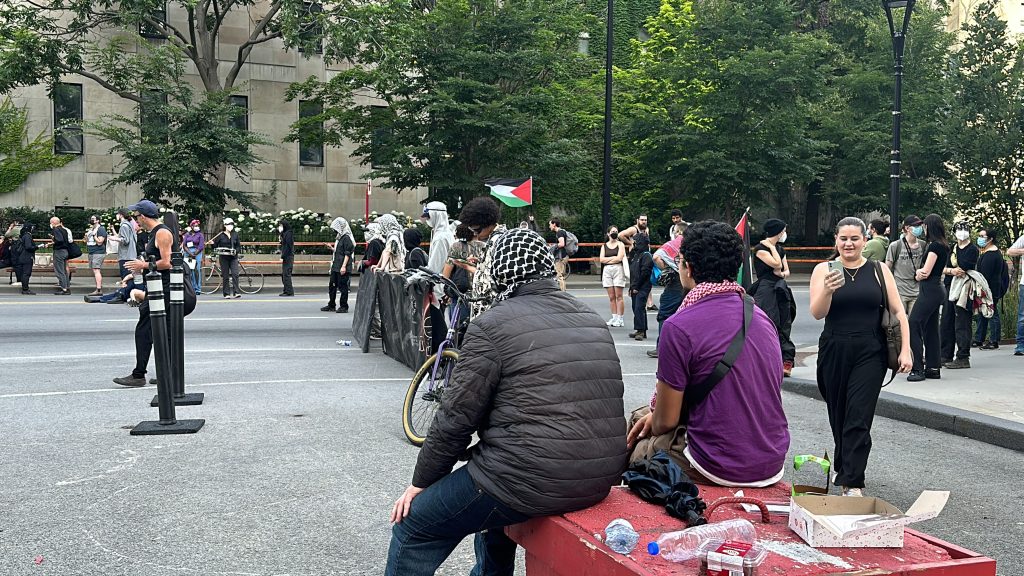
Why McGill says they acted to dismantle the encampment
McGill University said that there are a few specific reasons why they decided to dismantle the camp, in their press release explaining that Montreal fire safety officials, police, and McGill staff had long been denied access to the camp.
“Given the growing risks and the impossibility of knowing what was happening inside, the University engaged a firm to investigate the activities within the encampment.”
They explained that few members of the McGill community are in the encampment.
That there are significant health and safety risks. “Two drug overdoses occurred in the camp since July 6. Syringes are visible, and illegal narcotics have been sold there. The camp is infested with rats. There are fire risks, including a propane canister and flammable materials next to the tents.”
The University also claims that “the encampment is a magnet for violence and intimidation. The camp continues to attract protesters intent on violence, as the multiple incidents of vandalism on July 5 show. Certain people in the camp are planning to cause further damage to McGill, for example through vandalism.”
McGill President and Vice-Chancellor said in the press release that, “This camp was not a peaceful protest. It was a heavily fortified focal point for intimidation and violence, organized largely by individuals who are not part of our university community.”
In a social media post on Wednesday afternoon, Pascale Déry, Quebec’s Minister of Higher Education, said: “Finally!”
She added that they have been saying for several months that camps have no place on campus. Déry said McGill took the necessary actions to put an end to “this unbearable situation.”
Enfin! On le dit depuis plusieurs mois, les campements n’ont pas leur place sur nos campus. @mcgillu a pris les actions qui s’imposaient pour mettre fin à cette situation insoutenable. L’opération n’est pas terminée, on continue de suivre la situation de près.
— Pascale Déry (@PascaleDery) July 10, 2024
Encampment at McGill was setup at the end of April
The protesters set up camp on April 27 at McGill, following similar demonstrations at other university campuses in North America.
Participants demanded that the university end its investments in companies that profit from Israel’s military operation in Gaza, and that management cut all ties between McGill and Israeli universities.
“McGill chose to defend its investments in the genocide in Gaza and they chose it over the interests of their own students. They chose private interests over the public and over its students. Students that pay tuition that are allowed to be on this campus, you know, the city and the police, this is not their decision,” said Abisaab. “Students are not allowed to be on their own campus. And yeah, we were all threatened in various ways.”
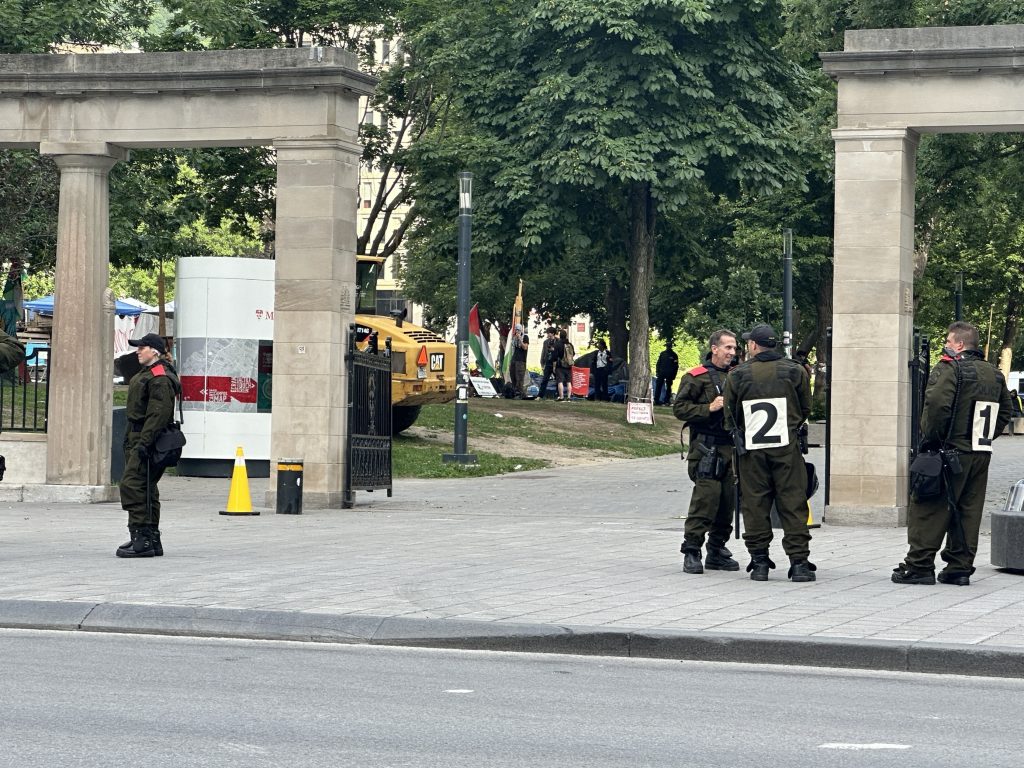
In an email statement, a representative for SPHR McGill said: “Our solidarity for Palestine is not contingent on the administration’s refusal to negotiate with its own students. A student front has mobilized for Palestine for decades and we will continue to act on this precedent so long as McGill insists on its shameful complicity in this genocide which continues to unfold before us. Despite the baseless attempts to to criminalize this camp, despite the baseless accusations, the student front will continue to mobilize for Palestinian Liberation.”
They add that, “Students and supporters have vowed to continue resisting oppression until McGill divests and Palestine is free.”
On two occasions, requests for injunctions to force the dismantling of the camp have been rejected by the Superior Court.
Tension at the camp reached a climax on June 6, when demonstrators took over an administration building at the school. Police intervened and arrested 15 people.
Negotiations have taken place in the past between the camp organizers and McGill management, during which the university proposed measures to meet some of the protesters’ demands, but the talks failed to convince the participants to dismantle the camp.
“As long as McGill continues to fund the ongoing genocide in Palestine, we will continue a campaign of escalation on campus,” the protesters wrote in an Instagram post in early July.
Other encampments set up elsewhere in Quebec have been dismantled by the protesters following agreements with the universities concerned.
Last week, the City of Montreal dismantled another encampment in Square Victoria.
–With files from The Canadian Press


